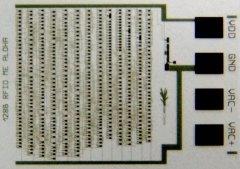Feb 9 2009
At this week's International Solid State Circuit Conference, Holst Centre - founded by the Belgian nanoelectronics research center IMEC and the Dutch research center TNO - presents world's first 128 bit organic RFID transponder chip with Manchester encoding, anti-collision protocol and record high data rate. The reported RFID transponder chip is a major step towards the application of organic RFID tags in electronic product coding (EPC).
 Photograph of Holst Centre’s 128 bit RFID transponder foil.
Photograph of Holst Centre’s 128 bit RFID transponder foil.
State-of-the-art organic RFID transponder chips do not yet meet the specifications of EPC, which is one of the major target applications.
However, with a record data rate of 2kb/s, Manchester encoded data, the implementation of ALOHA anti-collision protocol to enable readout of multiple organic RFID tags, a ROM memory capacity of 128 bit and additional WORM (write-once read-many-times) memory, Holst Centre's RFID research demonstrator chip approaches EPC application.
The organic 128b transponder chip is fabricated on a 25µm thin plastic substrate using organic bottom-gate thin-film transistors. The design of the chip was limited to p-type only logic. The chip requires a supply voltage of 20V to 24V which can be generated on a tag equipped with a plastic double half-wave rectifier and an antenna of 6 to 7 windings.
The transponder chip contains a 33-stage ring oscillator which generates the clock signal. The clock signal drives the output register, the 3 bit binary counter and the 16 bit line-select. The 16 bit line-select chooses a row in the code. A bit in this row is selected by the 8:1 multiplexer, driven by the 3 bit binary counter. This bit is transported to the output register, which sends the bit to the Manchester encoder. The latter encodes the data and sends it to the load modulator of the plastic RFID tag. To enable the readout of multiple organic RFID tags at once, the ALOHA basic anti-collision protocol (tag-talks-first protocol) is added to the chip.
The work was done within the framework of the Holst Centre research program on organic circuitry, in close collaboration between IMEC Leuven and TNO Eindhoven.